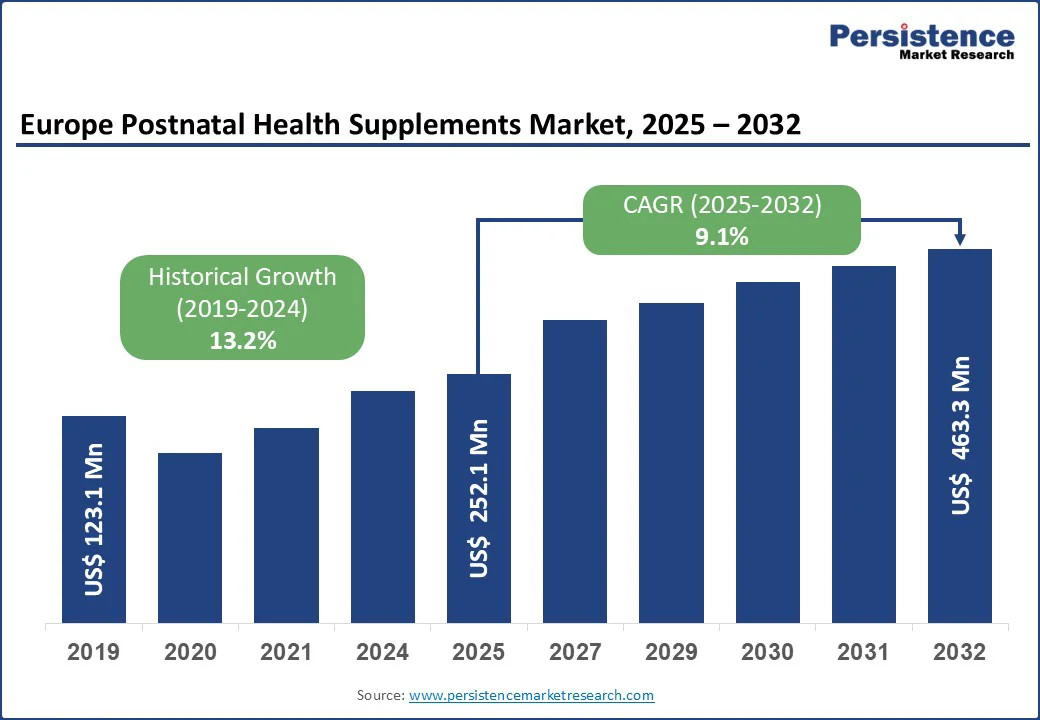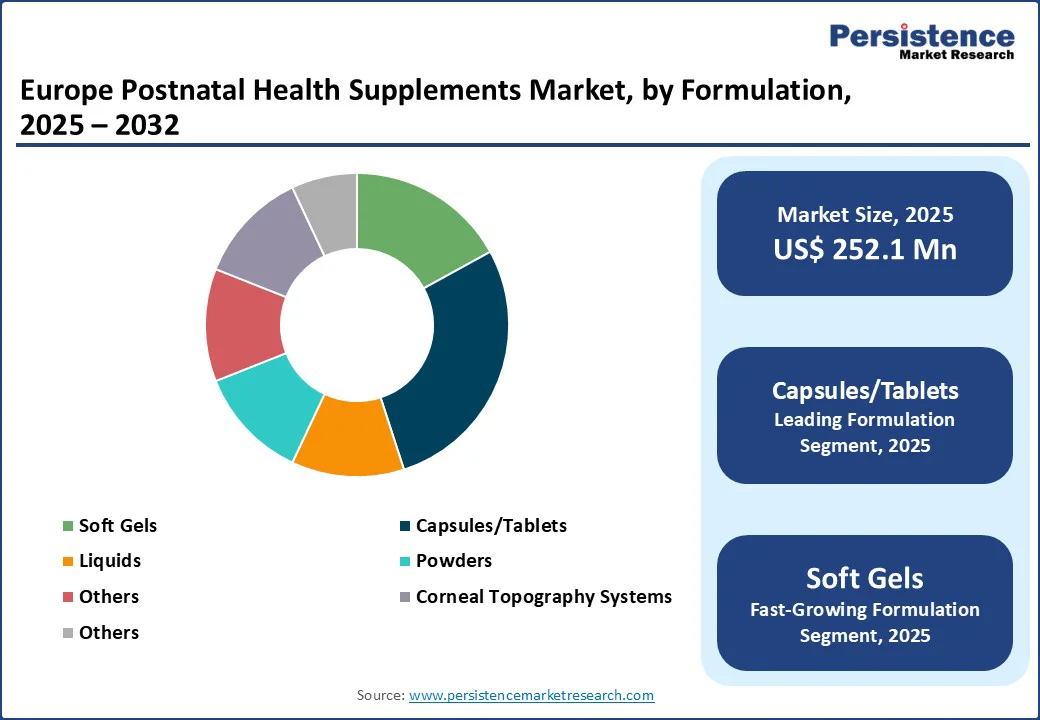ID: PMRREP35614| 175 Pages | 15 Sep 2025 | Format: PDF, Excel, PPT* | Healthcare

Europe's postnatal health supplements market size is likely to be valued at US$252.1 Mn in 2025 and is expected to reach US$463.3 Mn by 2032, growing at a CAGR of 9.1% during the forecast period from 2025 to 2032.
Key Industry Highlights:

|
Europe Postnatal Health Supplements Market Attribute |
Key Insights |
|
Europe Postnatal Health Supplements Market Size (2025E) |
US$252.1 Mn |
|
Market Value Forecast (2032F) |
US$463.3 Mn |
|
Projected Growth (CAGR 2025 to 2032) |
9.1% |
|
Historical Market Growth (CAGR 2019 to 2024) |
13.2% |
Europe's postnatal health supplements market is witnessing steady growth, driven by rising awareness of maternal and infant health. Postpartum nutritional support is increasingly recognized as essential for recovery, energy restoration, and breastfeeding. Combined nutritional supplements are the most popular product segment, favored for their comprehensive benefits.
Across Europe, postnatal care protocols are increasingly emphasizing the role of nutritional supplements as a key component of maternal recovery. Healthcare professionals, including obstetricians, gynecologists, and midwives, are recommending targeted vitamins, minerals, and combined nutritional formulations to support mothers during the critical postpartum period. This integration goes beyond merely addressing nutrient deficiencies; it aims to enhance overall maternal health, promote faster recovery, improve lactation, and support emotional well-being.
By embedding supplements into standard care routines, medical practitioners are normalizing their use, increasing trust among new mothers, and encouraging adherence. Consequently, supplements are no longer seen as optional but as essential tools for holistic postpartum care, driving widespread acceptance and consistent consumption across the European market.
In recent years, European consumers have become increasingly conscious about the ingredients in postnatal health supplements, particularly regarding artificial additives, synthetic preservatives, and chemical fillers. This heightened awareness stems from concerns over long-term health effects, potential allergic reactions, and the desire for a more natural postpartum recovery process. As a result, there is a growing preference for “clean-label” supplements that prioritize organic, plant-based, and minimally processed ingredients.
While this trend reflects a positive shift toward healthier consumption, it presents significant challenges for manufacturers. Reformulating products to meet these expectations often involves higher production costs, sourcing difficulties, and rigorous quality assurance processes, making it a complex task to balance efficacy, affordability, and consumer trust in the postnatal supplement market.
Personalized postnatal nutrition represents a significant opportunity in the European health supplements market, focusing on creating formulations that cater to the unique needs of each new mother. These supplements are designed by considering critical factors such as breastfeeding status, activity level, age, and existing nutrient deficiencies, ensuring that mothers receive precisely what their bodies require during the postpartum recovery phase. Unlike generic supplements, personalized solutions can target specific concerns like iron or calcium deficiencies, lactation support, or energy restoration.
By leveraging modern diagnostic tools, genetic insights, and digital health tracking, companies can offer customized nutrition plans that enhance maternal well-being, support faster recovery, and improve overall health outcomes, while also fostering stronger brand loyalty among health-conscious mothers.
Combined nutritional supplements are leading the European postnatal health supplements market because they offer a holistic approach to maternal recovery and well-being. These formulations blend essential vitamins, minerals, and bioactive compounds in one product, addressing multiple postnatal needs such as energy restoration, lactation support, mood balance, and immunity enhancement.
Their convenience reduces the need to consume multiple single-nutrient supplements, making them highly preferred by busy new mothers. Moreover, healthcare professionals increasingly recommend multi-nutrient solutions for efficient recovery, further boosting demand. Growing consumer preference for comprehensive, science-backed, and time-saving nutrition solutions continues to drive the dominance of combined supplements across the European postnatal segment.
Capsules and tablets are dominant as they provide a balance of convenience, affordability, and consumer trust. New mothers prefer capsules and tablets as they are easy to consume, portable, and allow precise dosing, ensuring consistent nutrient intake without the need for preparation. These formats also offer a longer shelf life compared to liquids or powders, making them more practical for retail and home storage.
From a manufacturing perspective, capsules and tablets are cost-effective to produce and allow companies to combine multiple nutrients into a single dosage form, supporting the strong demand for combined postnatal supplements. Moreover, their familiarity and acceptance among European consumers, backed by strong distribution through pharmacies and drugstores, reinforce their market leadership.

Germany leads the European postnatal health supplements market due to its strong combination of healthcare infrastructure, consumer awareness, and innovation. The country has a well-developed pharmaceutical and nutraceutical sector that emphasizes stringent quality standards, ensuring trust in supplements consumed by new mothers. German consumers are highly health-conscious, with increasing awareness about the importance of maternal recovery, lactation support, and mental well-being after childbirth.
Additionally, Germany’s focus on research and development has resulted in a wide range of advanced formulations, particularly combined nutritional supplements. A large postpartum population, coupled with higher disposable incomes, supports robust demand. Strong pharmacy networks, online distribution channels, and regulatory compliance further consolidate Germany’s position as the most lucrative market in Europe.
The competitive landscape of Europe postnatal health supplement market is highly dynamic, marked by strong rivalry between established supplement providers and emerging niche brands. Competition is shaped by innovation in formulations, with a growing focus on clean-label, plant-based, and organic products to attract health-conscious mothers. Companies compete through extensive distribution networks spanning pharmacies, supermarkets, and e-commerce, with digital channels increasingly becoming a key differentiator. Brand trust, scientific validation, and product safety remain crucial competitive factors
Europe postnatal health supplements market is likely to be valued at US$252.1Mn in 2025.
Increasing focus on postpartum recovery, lactation support, and nutritional balance is driving supplement demand.
Europe postnatal health supplements market is poised to witness a CAGR of 9.1% between 2025 and 2032.
Development of supplements tailored to individual needs based on breastfeeding status, nutrient gaps, and lifestyle.
The UK accounts for a major share in Europe postnatal health supplements market.
|
Report Attributes |
Details |
|
Historical Data/Actuals |
2019 - 2024 |
|
Forecast Period |
2025 - 2032 |
|
Market Analysis |
Value: US$ Mn Volume: As Applicable |
|
Geographical Coverage |
|
|
Segmental Coverage |
|
|
Competitive Analysis |
|
|
Report Highlights |
|
By Product Type
By Formulation
By Distribution Channel
By Country
Delivery Timelines
For more information on this report and its delivery timelines please get in touch with our sales team.
About Author